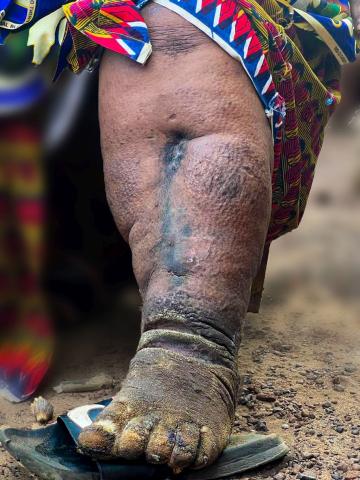By Nasratu Kargbo
Bombali District remains the only district in the country where lymphatic filariasis also known as elephantiasis, is still transmissible in Sierra Leone.
Deputy Chief Medical Officer Public Health, Dr. Alie H. Wurie made this revelation on Monday, 30 January, during a panel discussion held to mark World Neglected Tropical Diseases (NTD) day.
Dr Wurie said that there were people in different parts of the country with the condition known locally as “Big fut”, but that unlike in Bombali the disease cannot be transmitted in those other areas due to the treatment they had been receiving.
When asked why eliminating transmission remained difficult in Bombali, the Deputy CMO explained that they found out from those being infected that whilst the mass drug administration was ongoing, they refused to take them.
He emphasised that the disease was not too prevalent in the district, stating that it was concentrated in only specific localities in the Makarie and Safrohoh Chiefdoms. He said that with the current concerted efforts they would soon stop the transmission in those areas.
Speaking confidently, Dr Wurie said that he was optimistic Sierra Leone would eliminate the transmission of the disease even before the 2030 target set by the World Health Organisation.
Explaining his reasons for his optimism, the Deputy CMO said they’d involved key community stakeholders such as traditional healers and religious leaders, revealing that they’d seen massive improvements.
One of the panelists, Ibrahim Sesay – a former deputy health minister and a Consultant Medical entomologist – explained that the disease was still transmissible in those two localities because the people there were deeply entrenched in their belief system. He said they were places well known for traditional healers who would take on all types of disease. “Therefore we need to work with the traditional healers to achieve our goal,” said Sesay.
He said they’d trained the healers to determine the limbs needed medical attention, adding that they had also provided the healers with the tablets to give to patients who present with the symptoms.
Explaining how the disease can be transmitted, Sesay said the female anopheles mosquito was the vector that transmits the disease from person to person, explaining that when the mosquito picks up the disease from an infected person, it harbours the disease for two weeks before transmiting it to the next person it bites.
He added that there was no vaccine to prevent elephantiasis, because it is caused by a parasite and not a viral disease.
The NTD Program Director at Hellen Keller International, Mohamed S. Bah explained the reasons why the disease was still in the district. He said they had observed that many traditional healers were found in the district, adding that people believed that the healers could cure the disease. He said that in some areas people still believed that one could get “big fut” due to witchcraft or a curse.
Bah said they now work in collaboration with traditional healers, which would serve as a way to stop transmission. “It is the end game for elephantiasis, our focus is in the hotspot areas”, he said.
Highlighting what they did right to stop the transmission of the disease in other districts, S. Bah stated that they were involved in mass drug administration.
Bah said that before the administration of drugs they had conducted a survey in 2007/2008 which showed that the country was endemic of lymphatic filariasis.
He explained that they did a mass drug administration for five years and that they did the first impact assessment in 2013, to determine whether they were on the right track to proceed to interrupt transmission.
He noted that the life span of an adult worm had an incubation period of five/six years, stating that as a result of that effective treated was administered for five to six years. Bah sadly stated that when once one had a swollen limb, the condition was irreversible even after the worm is killed in the victim’s body.
Bah assured of the commitment of the government and partners to eradicate the disease in the country.
Neglected Tropical Diseases are mostly only prevalent in poor countries, where people do not have access to clean water and safe means to dispose human waste. NTD include diseases such as lymphatic filariasis known as elephantiasis, onchocerciasis or river blindness, schistosomiasis or snail fever, and soil transmitted helminths or intestinal worm. They are called NTDs because they have not been given attention like other diseases even though they are debilitating.
The theme for this year’s NTD day is “Act now, Act together, Invest in NTD”. The fight against NTD in Sierra Leone is sponsored by USAID through Hellen Keller and others.
Copyright © 2023 Politico Online (01/02/23)








